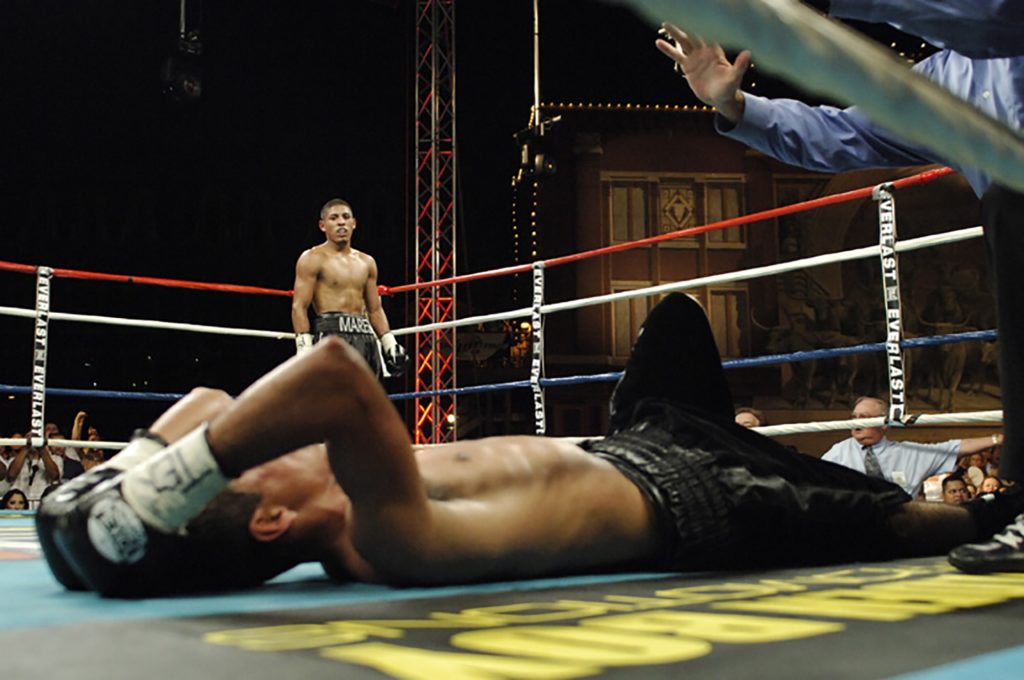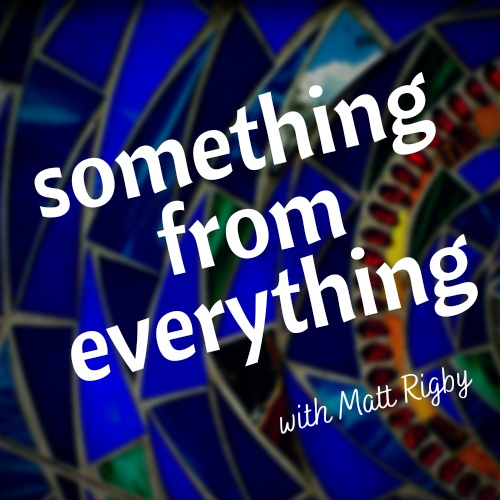
Picture a boxer. On the mat. Bewildered, the unidentifiable hum of noise all around, the blurring lights coming in and out of focus above. The fighter knows he has to get up… as soon as he can figure out which way is up.
I’ve played a lot of different sports, but I was never a boxer, and I’ve only ever been in a handful of fights, but I’m well aware of what being completely blindsided by a hit feel like.
Here’s a truer, and much less sexy story than the cliched sports analogy. Two weeks ago I was carrying out way too much recycling. So much recycling that my hands were full, my arms were full, and I was holding this pile of miscellaneous items in place with my chin, and I couldn’t see my feet. And I slipped. I fell hard, my entire body crashing to the ground at once. Unable to see the ground coming to meet me, unable to brace my fall, unable to do anything but slam into the cold tile, and temporarily leave my body as everything hurt, and every other sense was temporarily dulled.
Now I don’t know if you have ever been a boxer or fighter, and I don’t know if you’ve ever fallen flat on your face taking in one trip what you should have done in two or three… but I’m willing to bet you’re familiar with this experience.
Late last Tuesday night, I and many others like me (though not all…), took the worst kind of hit. The one you don’t see coming.
This experience, this unexpected, unguarded hit to the head – this is the metaphor I’ve been drawn to in the aftermath of the US election. Rob Bell likened left-leaning people and media pundits after the election as “meat sacks just wandering around”. Wandering around, disembodied, staggering. Like our boxer on the mat. Like those people you see on the news footage after a nearby catastrophic event.
And here I feel like I should dial it back a bit. This is an election, not a nearby bombing, right? And I live in a different country, right? I am not a woman, a Latino, a Muslim, an African-American, a member of the LGBT community, or any of the many other population groups that Trump has actively attacked or targeted. But it feels like the hit just connected that hard. And with every new emboldened hate crime, with every new appointment of a climate change denier or white supremacist… the hits just keep coming. A whole country over, I’m still staggering and trying to clear my head. And I’m not alone.
This is a pretty common experience among those who hoped or thought that the Democrats would be successful. Everybody expecting that outcome, took a hit. But after that staggering blow, the responses have been varied; we lose some commonality. Some are already up and fighting. Some are staggering and falling over themselves in trying to get up. Some are still on the mat.
The ones I consider still on the mat are hopeless. That’s not a knock at them – in a lot of ways I’ve been one of them- I mean literally they are devoid of hope. They don’t have a reason to believe things will be better if they get up.
Hopeless looks like a lot of things. A lot of what I read online has an edge of cynical resignation. It looks like a lot of dark humor. It looks like hunkering down for the next four to eight years. It looks like relocating to Canada (No judgement – come on up, it’s awesome here).
So why are some people hopeless, while others are already up and fighting? Where does hope come from?
If you’ve read these posts for any length of time, you likely know that I’m a huge fan of Brene Brown’s work. In her research, she uncovered that an individual’s hope was not a bi-product good socio-economic status, but rather of resilience. Children who had faced adversity, and overcome (which also includes losing and learning), we’re able to be hopeful in times of challenge, are able to embody hope, not out of naivety, but through hard won experience. They were also notably more hopeful than children whose parents had sheltered them from all conflict.
In boxing there’s a term I’ve always been intrigued by – the glass jaw. The boxer who can’t take a hit. The notion that someone could be the biggest, leanest, meanest looking mother, but if they couldn’t take a good hit and keep going – they were considered to have a glass jaw. Alternatively, a boxer who may not be as big or fast or have as long a reach could still gain an unexpected victory by the simple virtue of being able to hang in there longer.
I think this past election has shown that a lot of us left leaning social progressives have glass jaws. I know I certainly do. And I think this has a lot to do with us being amateur activists. This might be especially true if we inhabit a place of power and privilege – because like the sheltered kid in Brene Brown’s research, we haven’t had as much experience with getting knocked around, knocked down, and getting back up. Online angst and activity often feels like a whole lot more than it is. I can spend a whole day on Twitter or Facebook and not accomplish a damn thing. I’ve cast my lot in with the left, I’ve shared stories about Trumps horrific claims or hilarious missteps, I’ve re-tweeted clever articles and quotes and memes. And if I spend enough time listening to and quoting and re-tweeting and writing about advocates and activists, I might actually believe I am one.
And in a way I am. I take this blog seriously, despite the handful of people following it (thank you – by the way!). I believe a mind is shaped by beautiful questions, and wisdom gained from listening to wise teachers, wherever you find them in life. And I think at it’s best, Twitter and Facebook can connect us with those far away and actually serve as a method for disseminating knowledge worth sharing.
But this can all be done from the comfort of my couch. It is cynically labeled ‘slacktivism’ for a reason.
With all of the race-charged rhetoric of this past election (and ongoing daily now), I’ve been drawn to the stories of the 1960’s civil rights movement. On Being has recently been highlighting interviews with these great leaders and thinkers, as we look for wisdom for our current social climate.
One of these leaders is John Lewis, a US congressman from Georgia, and a civil rights leader with Martin Luther King Jr. He relates how in preparation for any march, or ride, or event, the activists would meet and study together.
“a small group of students every Tuesday night at 6:30 p.m. would gather in a small Methodist church…we had a teacher…. who taught us the philosophy and the discipline of nonviolence. We studied. We studied what Gandhi attempted to do in South Africa, what he accomplished in India. We studied Thoreau and civil disobedience. We studied the great religions of the world. And before we even discussed a possibility of a sit-in, we had role-playing. We had what we called social drama. And we would act out. There would be black and white young people, students, interracial group, playing the roles of African-Americans, or be an interracial group playing the roles of white. And we went through the motion of someone harassing you, calling you out of your name, pulling you out of your seat, pulling your chair from under you, someone kicking you or pretending to spit on you. Sometimes we did pour cold water on someone, never hot — but we went through the motion.”
Now, that is preparation. That is a tilt. That is a fight. In another interview, the late Vincent Harding, a civil rights leader, speech writer and also a friend to Dr. Martin Luther King Jr. relates how many of the same Civil Rights activists that he marched with are still going strong. Still fighting hard, ever resilient these 50 some years later. He also reminds the listener that though we might find such obvious racism and xenophobia shocking, that “when it comes to creating a multiracial, multi ethnic, multi religious, democratic society, we are still a developing nation”.
And many of us are developing activists. That’s okay. Let start with acceptance. We’ll get there. I’m afraid we’ll have lots of chances to practice. We’ll ask forgiveness for not stepping into the ring earlier. But let’s also acknowledge that we are the newbies, the inexperienced, the glass jaws. Let’s be humble and look for the heavyweights, those who have cared and fought for years. Who can point us in effective directions, who can show us how to leverage our privilege. Who can help pick us up when we get knocked down ourselves.
I’m glad we have some small notion of what it means to get knocked down, to feel powerless, to want to fight. Because now we can get back up. Now we can shake it off. Now we keep fighting.
Because if you keep getting back up, they don’t call you a glass jaw. When you keep getting back up, they just call you a fighter.

Leave a Reply